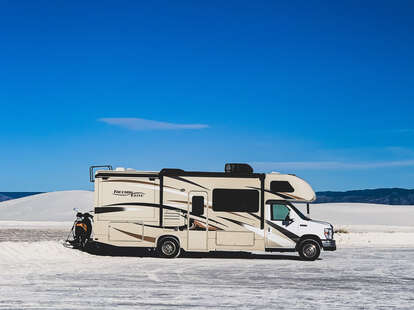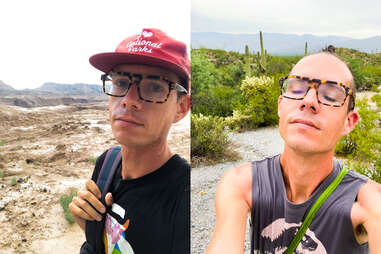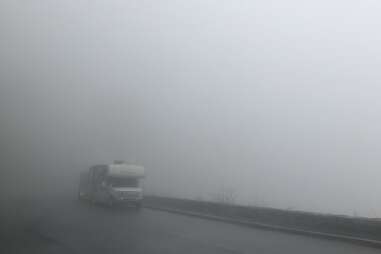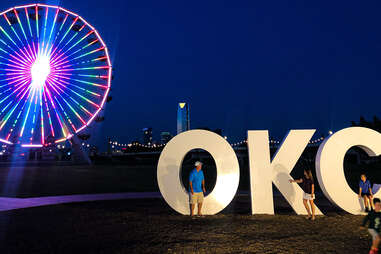Why I Pumped the Brakes on Vanlife
There might be cracks in the rose-tinted windshield.

Over the past few years, #vanlife and #rvlife have become romanticized for epitomizing freedom, escapism, and wanderlust. From Nomadland’s Oscars haul to endless articles about the allure of life on the road and influencers traversing the continent in twee vans, it’s a lifestyle that suddenly appealed to stir-crazy travelers, adventure-seekers, and anyone enticed by its seemingly endless opportunity.
While the notion of minimizing and living full-time on the road previously conjured stereotypes of roving hippies and snowbird seniors, the pandemic helped shift the narrative. With air travel off the table and many businesses and attractions closed, vans and RVs opened Americans’ eyes to the country around them in a whole new way. With a renewed appreciation for road trips and an uptick in remote work, life on wheels was the hottest new trend for folks from all walks of life—myself included. That is, until the harsh downsides of RV life outweighed the upsides, compelling me to hit the brakes and find a new sense of home again.
“Once the rose-colored windshield wore off, I found myself stir-crazy in an unexpected way.”
Back in 2018—before the pandemic made it vogue—I sold my condo in Chicago, whittled my belongings to the bare minimum, and moved into a 26-foot motor home. I had toyed with the idea for a while, but eventually realized that I actually could live this way and still work as normal. In fact, as a travel writer, it made total sense to travel full-time, so why not do it while I could?
My fanciful goal was to explore the US more intentionally and to untether myself from my own self-imposed safety net. After living in a big city for upwards of 13 years and building my career, it was risky and daunting to take such a leap of faith, but the innate flexibility of my life granted me a once-in-a-lifetime opportunity I didn’t want to miss.
So many others feel the same pull. Remote workers, retirees, families, couples—they’re all drawn to a lifestyle that’s more dynamic and less encumbered. To break free of the daily hustle and bustle, and out into a world of vast opportunity and excitement, is truly living the American dream. Some do it for a summer, some for a decade.
For me, two years was enough.
The thing about #vanlife or #rvlife that most enthusiasts and influencers don’t tell you is that it’s not all roses and national parks and quirky roadside attractions. Yes, all of those things are a lot more accessible when living on the road full-time. But you lose a lot along the way as well. Like my identity.

As grateful as I am that I took the plunge and proved to myself that I could uproot from my urban security blanket, there were many aspects of the experience that were just unsustainable. For every momentous joy along the way, there were bumps in the road, too—both in the literal sense that the slightest pothole shattered my coffee equipment and the figurative way it paved the way to the end of my marriage.
Whereas living in Chicago afforded me a spacious condo and a sprawling city teeming with neighborhoods and culture, my motorhome essentially reversed my sense of freedom and space. As free as it feels to explore national parks and the open road, my sense of “home” was a cramped box with barely enough storage space for a winter coat.
While living in Chicago as an obviously gay man, I felt free to be my unabashed self, clad in all manner of sequins and androgyny. On the road, not only did I literally not have the closet space to accommodate such a wardrobe, but I often didn’t feel safe presenting myself the same way in unfamiliar regions. Despite experiencing kindness across the country, there were times when I’d be too wary to exit the RV at rural gas stations, deterred by the glares I was getting through my window. And in Wyoming, a beautiful state that I adore, a group of teens shouted homophobic slurs and joked about assaulting me—all while I was wearing the most muted, all-black outfit I could possibly find to “hide” myself.
“Vans and RVs—vessels of undeniable introspection—accelerate the emotional process and map out the inevitable.”
I know everyone presents differently, and everyone finds comfort in different ways. For some—be it a queer person, BIPOC, or straight traveler—the remote wilds of Wyoming might fit like a glove. And believe me, my life on the road engendered a newfound adoration for these remote regions as well. It’s just that, after shifting cultural gears for an extended amount of time, it started to feel unsustainable. Once the rose-colored windshield wore off, I found myself stir-crazy in an unexpected way—yearning for the stability of a home base. Of more closet space. A bed that didn’t fold up. Of room for my dachshund to run around, and of a place where I could feel authentically myself again.
You know it’s time to pump the brakes when this lifestyle stops feeling healthy and starts feeling stifling.

A lot of us move into vans and RVs to explore and discover. Not just to see gorgeous sights and quirky towns, but to discover more about ourselves. As such a tidal shift in lifestyle, ditching a home for one on the road means you inevitably have a lot of time and space for reflection.
Although some rovers might find endless joy in the wanderlust, others have a lightbulb moment that signals some finality. That’s because, out on America’s vast highways and deep in its wilderness, there’s nothing to distract from what’s immediately around you, and what’s in your head.
That could mean coming to terms with your own inner demons, or realizing your itinerant family needs more of a tangible routine. In my case, it meant realizing that my marriage—the one that took me on the road to begin with—wasn't working. Deep down, as much as I deluded myself that our fraught relationship was “normal,” I knew the RV life held a magnifying glass to something I couldn’t deny forever. Vans and RVs—vessels of undeniable introspection—accelerate the emotional process and map out the inevitable.
For me, I knew it was time to find the end of the road when this life, and these all-natural places that once inspired pure awe, began to make me feel alone. Despite cohabiting with someone in a space no bigger than Barbie’s Dreamhouse, I felt isolated and lonely, tasked with overwhelming responsibilities and homesick for friends, family, and a sense of community.
In part spurred by the pandemic, we nixed our extended travel plans in 2020 and opted for longer stints in cities we had experience with and knew we loved—testing them out as trial periods for a potential new home base. It started with two months in Tucson before the impending summer heat turned the RV into an Easy Bake Oven. Next was two months in Santa Fe, but it quickly became apparent that it worked better as a recurring vacation destination.
Oklahoma City, as Goldilocks would say, was just right.

My ex and I moved to Oklahoma City in our RV in the summer of 2020 and wound up buying a house later that year. The sense of community and camaraderie materialized instantaneously, affording me another rewarding chapter in my writing career. I became the first openly gay person to write a cover story for The Oklahoman—writing about my time in the RV and what inspired us to move—followed by a Hometown Hero award from the city in 2023 for my cultural contributions and my work sharing queer stories in Oklahoma. I also found the space and culture I so badly missed on the road, all while wearing sequins again and dying my hair hot-pink.
The renewed space also led to some emotional reckoning. It turns out, when not confined to a 26-foot RV with one another, my ex-husband and I had dramatically different interests and priorities—a bit of brutal honesty I couldn’t even allow myself to think about, let alone address, while on the road. Living a life as dynamic-yet-confined as we did magnified our shortcomings, our needs, and our irreparable differences.
"Hitting the brakes on the nomadic lifestyle can be just as freeing as exploring the wide-open road."
Pangs of homesickness can take many shapes. Meeting fellow nomads on the road, or simply via social media, I heard stories of medical hardships (it’s hard to find hospitals when you’re hundreds of miles from civilization with no internet), and of depression (the quiet of national parks is beautiful until it starts to feel crushingly lonely). At a certain point, the solitude of #vanlife can become suffocating.
And it turns out, hitting the brakes on the nomadic lifestyle can be just as freeing as exploring the wide-open road.
Traveling full-time across this beautiful, diverse country is an incredible experience I’ll forever be grateful for. I saw places I never imagined and did things I never thought I’d do. Those two years opened my eyes to new communities, cultures, and histories, and revealed enriching new opportunities in my career, including the opportunity to launch a national parks podcast with iHeartRadio.
It also led me to a city I’m proud to call home—one where I’ve formed a strong network of loyal friends and met my new husband, together building the kind of dream life I used to only think existed on wheels.
Ultimately, more than anything, that lifestyle taught me more about myself than I ever expected, and part of that lesson was knowing when the time comes to pump the brakes and call it quits… in more ways than one.